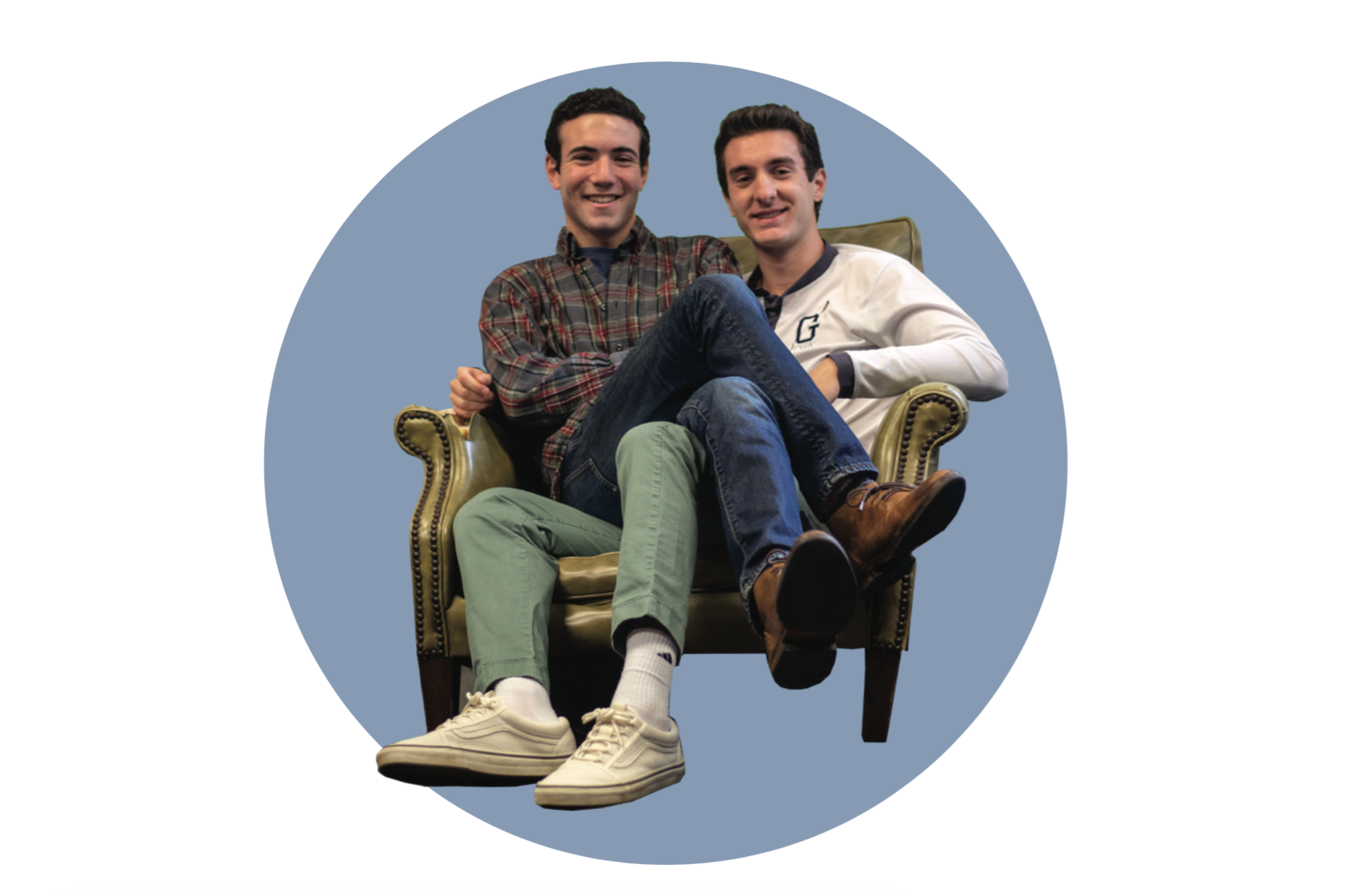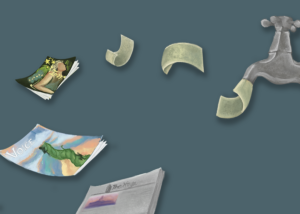With elections for GUSA Executive coming up on Feb. 8, the Voice invited all of the candidates to our office to talk about why they are running, what issues are most important to them, and to have a seat in our green chair for a picture. This is our conversation with Ryan Zuccala (MSB ’20) and John Dolan (MSB ’20). This interview has been edited for clarity and length.
The Voice: Could you guys first tell me a little bit about yourselves and what you have done over your Georgetown career?
JD: My name is John Dolan. I am a junior in the MSB studying finance and OPUM. I’m on the Georgetown lightweight rowing team, have been since freshman year, and I rowed in high school in Chicago. I am also VP of marketing at the credit union here which has been great. I love working there. I’m also a part of SAC, the student advisory committee for athletes. And that is most of my involvement on campus.
RZ: I’m Ryan Zuccala, also a junior in the MSB, studying finance and accounting though. I’m on the rowing team with John, and have been since freshman year, but I’m a cox on the team so I just yell at people for the most part. I’m also at GUSIF here at Georgetown and have been since freshman spring. I also do SAC with John. That pretty much takes up most of my time on campus.
The Voice: So, I’m just going to jump right in: Why are you guys running?
RZ: When we look at GUSA, for the most part, we don’t really see what they have done. If you ask most people on campus, they can’t really point to a specific thing that they can thank GUSA for. Again, our platform is pretty simple, it’s just three points. We want to lower student tuition, we want to get better dining options to students, we want to improve housing and have better fulfillment of work orders. When you submit a work order in Henle because your roof is leaking when it rains, you shouldn’t have to wait when you’re paying up to $70,000 a year.
JD: A lot of times, candidates come in with so many points that it’s hard to actually get things done in the year that you are elected into office. So, I think by narrowing it down to just a few things that we really want to focus on, it would be really beneficial for GUSA and the student body as a whole.
The Voice: So, I know it’s still early, but do you guys have any plans or ideas on how to implement these things?
RZ: To start with tuition, we looked through the budget that GUSA submitted last year and got approved for, and it was just north of a million dollars. A lot of those expenses we think we can trim down a bit. Not from the clubs, but from GUSA for example. GUSA got $24,000 last year, and $15,000 of it went toward GUSA’s activities, another $5,000 of it was toward transfer students. The transfer student thing we think is important but the $15,000, maybe we can start to shrink that down a bit, and another $4,000 is unaccounted for. I know these are small numbers but if we can start to decrease things little by little like that, we can see an overall reduction in tuition, if not a stagnation in tuition. We’ve been seeing a 4% increase consistently the last couple of years and that’s a lot of money to a lot of people at this point. We looked at the GPB who received $93,000 for the Spring Kickoff Concert, and we are really going to grill them on that. I would want to break that down and find out exactly where they are spending their money, and if we can decrease that by $10,000, along with other programs, we think we are going to see an overall reduction in tuition. Moving to better dining options, do you want to talk about that?
JD: We appreciate what GUSA has already done for the dining options. Mainly Hoya Hub, that’s a great thing that they have put together and helped advocate for. I think it is also important to get value out of your meal swipes. One swipe at Royal Jacket shouldn’t be worth $14, one swipe at Whisk is like a coffee and pastry. Chips and guac is a whole meal swipe. The guy who runs the whole Georgetown dining system is pretty good about hearing us out and talking. I think there is definitely room for improvement and getting more out of your meal swipe.
RZ: Moving to our last point, about better housing. The fact that only half of these Vil B’s are getting done right now, it shouldn’t be that difficult to get a good place to live. If you want a five person suite, Henle is your only option. At Henle, when it rains, the roof leaks, and you call in a work order and that can take up to four days for someone to come in and fix that. Meanwhile, it’s raining for 2-3 days and we had to put a bucket in our place.
JD: That creates mold which has been such an issue at Georgetown.
RZ: Yeah, yeah. You’re breathing that in and you can get sick from the mold. There are leaky showers, someone had their wall ripped out to get out a mouse and they didn’t come fix the wall for three weeks. [We just want] better housing for people and students.
The Voice: Ok, so what do you think would be your biggest challenge if elected?
RZ: I think just having three points, when a lot of people go in with too many good ideas, will be easier to get things implemented. I think the single hardest one is going to be the dining hall one, because you have to deal with an outside group. So we have to get in there as an advocacy group for students, which is our main job. We need to have a hard stance and get everyone’s voices heard.
The Voice: Going with that, you touched on what you think GUSA’s role is on campus. In your mind, what would be your responsibility as the executive specifically?
RZ: I know budgeting, the budget is a big thing that we need to submit in the next 2-3 days, we are just finalizing the last numbers now. The main job of the GUSA president, I think is to hear all students and to speak for them. You have the Senate, obviously, and everything we try to do gets passed through them. We think it is very important for students to be heard and that is our main job.
JD: We are also responsible for putting the right team together through our cabinet. We want to get people that we know can get things done, that are willing to harp on the message with the students and actually accomplish things. If we were elected, we would be very hands-on talking to people, making sure we oversee the people that we put into our cabinet and are getting things done. From our experience on the rowing team, and me on GUASFCU and GUSIF, we are very good at being leaders and leading a team of people.
The Voice: You kind of brought them up, but how do you plan to work with the GUSA Senate effectively?
RZ: There are a lot of people on the Senate we don’t know. I actually don’t think I know anyone on the Senate to be honest with you. I think that is important, though, because a lot of people don’t know GUSA senators or what they do. One of the hardest parts is going to be working with them, honestly. Coming as an outside group, they may look at us differently, as we are coming in to run GUSA or at least being the head representative of it. I don’t think they would disagree with any of our plans though, they are pretty straightforward. I don’t think anyone would disagree with better housing, better dining, and lowering tuition. Those are two pretty easy points to get behind. I don’t see much pushback.
JD: I think we can build a good relationship with them.
The Voice: You guys have said you are outsiders to GUSA, why do think that’s a good thing, and why do you think that is going to be tough for you.
RZ: I think if you are inside GUSA for a lot of the time, you start to just want to get back into GUSA. It’s good and it’s an important body at Georgetown, but you start to lose the touch of the people if you’re not with them all the time. I’m not saying John and I see everyone on the campus, but I consider ourselves two pretty regular guys. I think we have a pretty good pulse about what’s going on at Georgetown and a pretty good understanding of what people want. As outsiders we can really push that change because we haven’t really been through the bureaucracy that GUSA has and we are just going to get in there and get things done.
JD: The hard part will firstly be we don’t know the system and how GUSA works, so there may be problems that we haven’t foreseen. However, I think we are good problem solvers and we will be able to get over those hurdles pretty easily. I don’t know how our relationship will be with the senators. Obviously it’s hard when an outsider comes into a group that already knows each other. But, I don’t see a large problem or too many issues.
The Voice: Ok, next, how will you deal with hot button issues on campus like sexual assault or other issues like that?
RZ: One of the issues that we have been reading about has been resolution 272, and I have a friend actually who is taking a class on that and she sat me down the other day and really talked through it with me and told me what they were trying to do. It’s easy to say you agree with something on principle, but hearing the actual facts, I can say that John and I firmly support. We think it’s important to get the grants out for them and scholarships and things like that. As long as it is not at the cost of the general student body. I don’t want to make everyone else have to pay more for other students to pay less. Issues like sexual assault, obviously is a very important issue on campus especially within the past year with the Me Too movement coming out. It is very important to listen to survivors. There is a lot of skepticism sometimes when people make accusations. I think it is important to listen to the people and if they want to keep their names hidden that’s fine. They can come to any body and tell us something or whoever they want to go to. I know CAPS is a big thing with that and I think it is very important that we keep those institutions funded fully and willing to listen survivors because that is a very difficult thing to get through.
JD: Basically we want every students to be heard for all these issues. We are candidates for the people and that’s why we are running. I think it will be very important for us to listen to them, relay the messages, and solve these issues together.
The Voice: Winding down, last couple of questions. Do you guys have any ideas for events that you can put on at Georgetown to improve the everyday student experience?
RZ: I know part of the budget that GUSA gets can go to Georgetown Day in the spring, so that is something to continue. Any really new big events? I can’t really think of one. I know transfer day is a big event that GUSA gets a budget for and we can talk about that.
JD: Lecture Fund, maybe? Or no.
RZ: No, lecture fund, we can talk about that. So Lecture Fund is something we looked at. I know Georgetown Review, or one of the newspapers, wrote a review a few months back about how the Lecture Fund gets $79,000 or something around there and they bring it 80-90% Democrats instead of REpublicans. So maybe just pushing the Lecture Fund to be a little more balanced, to bring in both sides so everyone can hear both. I think we need to hear both sides and we want to push that.
The Voice: In terms of student club funding, do you have any plans on how you will support them?
RZ: We are not trying to pull funding from any student clubs. I know club sports got a small increase from last year, and we plan to keep that increase in line that is typical with inflation.
JD: Clubs are really important at Georgetown and we recognize that. We are in our own clubs and part of club sports also. Finding your group and different groups of people is important.
RZ: Some of our best friends are on the rowing team, and obviously not everyone is going to row or play basketball or volleyball. But if you want to play a club sport I know that the people you meet there are your best friends on campus and it’s very important to keep that funded so all students can be a part of club sports.
The Voice: Before the final question, is there anything you guys would like to add about your campaign?
RZ: SNAPS is a big issue for everyone living off campus. A few years ago some candidates went to defund SNAPS which we think is the wrong avenue as a whole. SNAPS’s job is to warn residents before MPD comes, but they can shut the party down and write you up. We think we should reform SNAPS so SNAPS’s job is to be more of a recommendation voice to people. So they can show up at your house if your party is getting too loud, there have been complaints, and they are recommending that the party gets shut down. We do want that buffer for Georgetown students because if the first person that shows up is MPD, then you are going to have a problem if anyone is there that isn’t supposed to be there.
JD: We do respect the Georgetown community and knowing that someone called in a noise complaint. That is good. But sometimes SNAPS just patrols around and listens for parties and I’m not sure that’s the best method for them.
RZ: Enforcing these penalties on students living off campus is wrong. Morally wrong. So we think reforming them on their job would be good for us.
The Voice: Perfect. Ok, final question, really serious, if you and your campaign were a freshman dorm, which one would you be and why?
RZ: Freshman dorm? I feel…Darnall
JD: Darnall? You want to give the reason why?
RZ: I think Darnall because we are trying to fix housing and we want to fix Darnall as well. I thin Darnall because we are trying to bring everyone up at Georgetown and a lot of people end up at Darnall and think its crap. I think Darnall represents how we want to bring up the bottom from Georgetown so everyone is at the same field.






